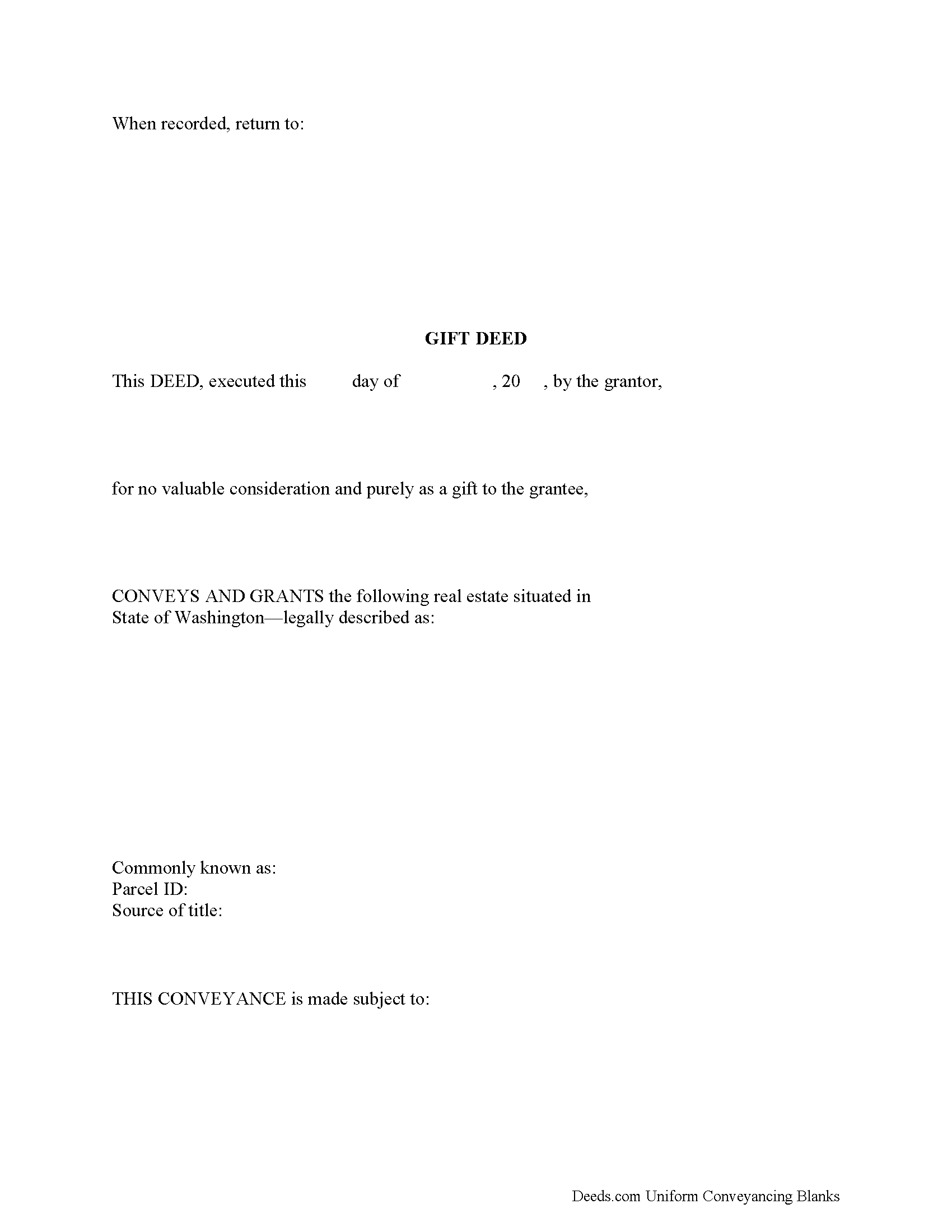Download Washington Gift Deed Legal Forms

Washington Gift Deed Overview

Gifts of Real Estate (Real Property) in Washington
A gift deed, or deed of gift, is a legal document voluntarily transferring title to real property from one party (the grantor or donor) to another (the grantee or donee). A gift deed typically transfers real property between family or close friends. Gift deeds are also used to donate to a non-profit organization or charity. The deed serves as proof that the transfer is indeed a gift and without consideration (any conditions or form of compensation).
In order for a gift deed to be valid they must meet the following requirements: The grantor must intend to make a present gift of the property, the grantor must deliver the property to the grantee, and the grantee must accept the gift. A gift deed must contain language that explicitly states no consideration is expected or required, because any ambiguity or reference to consideration can make the deed contestable in court. A promise to transfer ownership in the future is not a gift, and any deed that does not immediately transfer the interest in the property, or meet any of the aforementioned requirements, can be revoked [1].
A lawful gift deed includes the grantor's full name and marital status, as well as the grantee's full name, marital status, mailing address, and vesting. Vesting describes how the grantee holds title to the property. For Washington residential property, the following types of joint ownership are recognized: tenancy in common, joint tenancy and community property. A grant of ownership of real estate to two or more persons is presumed to create a tenancy in common, unless a joint tenancy with right of survivorship is expressly created in the conveyance. In the case of husband and wife, real estate automatically vests as community property (Wash. Rev. Code 26.16; 11.04.071; 64.28).
As with any conveyance of real estate, a gift deed requires a complete legal description of the parcel. If the entire legal description does not fit on the first page, use an abbreviated description, and enter the location in the document where the full description is located. It is not acceptable to "See attached" or "refer to Exhibit A" in place of abbreviating the legal description (Wash. Rev. Code 65.04.045). In Washington, any deed of real estate described by lot and block and addition or plat will not be filed or recorded until the plat of such addition has been filed for record (Wash. Rev. Code 65.04.030).
Recite the source of title to establish a clear chain of title, and detail any restrictions associated with the property. Record the completed deed, along with a completed Washington real estate excise tax affidavit, which is required for transfers by gift. A supplemental statement approved by the department must be completed and attached to the affidavit. (Wash. Rev. Code 458-61A-201)
The fee for recording a real estate deed in Washington is $73 to record the first page and $1 for each additional page. For recording plats, there is a minimum fee of $25 per plat. Each lot is $0.50 and each acknowledgment, dedication, and description is $1. (Wash. Rev. Code 36.18.010).
The grantor is responsible for paying the Federal Gift Tax. The IRS implements a Federal Gift Tax on any transfer of property from one individual to another with no consideration, or consideration that is less than the full market value. In accordance with federal law, individuals are permitted an annual exclusion of $15,000 on gifts. This means that if a gift is valued below $15,000, a federal gift tax return (Form 709) does not need to be filed. However, if the gift is something that could possibly be disputed by the IRS -- such as real property -- a grantor may benefit from filing a Form 709 [2].
In Washington, there is no state gift tax. For questions regarding state taxation laws, consult a tax specialist. Gifts of real property in Washington are, however, subject to the federal gift tax. The grantor is responsible for paying the federal gift tax; however, if the grantor does not pay the gift tax, the gratnee will be held liable [1].
With gifts of real property, the recipient of the gift (grantee) is not required to declare the amount of the gift as income, but if the property accrues income after the transaction, the recipient is responsible for paying the requisite state and federal income taxes [3].
This article is provided for informational purposes only and is not a substitute for the advice of an attorney. Contact a lawyer with any questions about gift deeds or other issues related to the transfer of real property. For questions regarding federal and state taxation laws, consult a tax specialist.
[1] https://nationalparalegal.edu/public_documents/courseware_asp_files/realProperty/PersonalProperty/InterVivosGifts.asp
[2] http://msuextension.org/publications/FamilyFinancialManagement/MT199105HR.pdf
[3] https://www.irs.gov/businesses/small-businesses-self-employed/frequently-asked-questions-on-gift-taxes